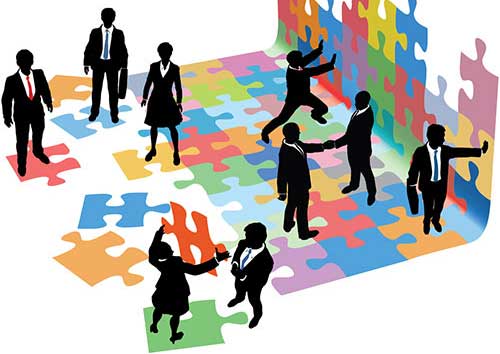When we talk about political development it refers to modernization of political structures, national unity, political culture, political participation, freedom of expression and so on. The most contentious components of political development consist of political identity, political legitimacy, political influence, political participation, political unity and power distribution. According to Huntington, no nation can reach political development unless crosses from six political crisis: identity crisis, legitimacy crisis, influence crisis, participation crisis, unity crisis and power distribution crisis. Obviously, without reaching to political development no nation would be able to overcome the political crisis. Political development enhances the state's capacity to mobilize and allocate resources, and process policy inputs into implementable outputs. Political development assists us with so many political issues such as problem‐solving, adaptation to environmental changes, economic challenges, security issues and overall national goal realization. The contemporary notion of good governance directly dwells on efficient, effective, and non‐corrupt public administration. In short, without political development we would not be able to move towards a better life and sound human relations. Therefore, the discourse of political development and its challenges is one of the most necessary topics of the day so as to help political leaders overcome the existing political challenges.
The first obstacle which challenges the political development process is lack of awareness and detailed studies about political development in Afghanistan. It seems that many of the traditional political leaders have no clear understanding about political development, indicators and theories of political development in the country. Therefore, they have never been able to initiate any political programs in past two decades except insisting on their personal and ethnical demands. As a result, the ethnical demands neither was able to gain the trust of people and nor was able to contribute in state building process. Unfortunately, some of the technocrat groups of society have also followed the footsteps of the traditional leaders because of not believing in political development. Though they have a very clean appearance such as businesslike suits and ties, cleanly shaved beards and even graduated from a well-known university, their monopolistic mentalities have not changed yet. Therefore, we need to understand and also believe in political development discourse in Afghanistan. Theoretically, it is not possible to realize political development without understanding and believing in modernization.
The second barrier which gravely challenges the political development is tribe and tribal traditions in Afghanistan. Principally, the theories of political development emerged in the context of the struggle between tradition and modernity. One of most important parts of the traditions is ethnic and tribal structure which acts as a challenging factor against modernization in the country. However, ethnic or race itself is not an obstacle, but ethnocentrism or racism tendencies are serious obstacles against political development. The reason is that Ethnocentrism and racism act as a barrier against modern mechanisms, adaptations, meritocracy and overall indicators of political development. Unfortunately, many of the third world countries that have not crossed from the tribal barriers as they still try to monopolize economic and political power within specific ethnical circles. As a result, the energy and talents of young intellectuals are largely wasted on how to knock out their ethnical rivals instead of addressing social and economic issues of the country.
The third issue which challenges the political development is a hostile view about political development. Many people think that political development is necessarily a process of westernization. This hostile view not only prevents political development in the country but also causes a serious confrontation between technocrat and religious groups in Afghanistan. The religious groups of society blame technocrats as westernized people who have no deep understanding about culture and spiritual life. On the other hand, the modernized people call traditionalists as resilient or ignorant factors that play a hindering role against modernization and development. According to scientific studies, nothing is fully black or white and nor all traditions and cultures act as a hinder against social and political development. For example, the scientific studies which carried out in some Asian countries such as China, Japan, Honkung, India and Iran, shows that tradition can play positive role in social and political development. However, some of the radical interpretations such as Salafism or Talibanism are undeniably incompatible with modernization components and values. Therefore, it will be too hard for Taliban to join the Islamic Republic of Afghanistan.
The third challenging factor against political development is the endless war and insecurity in Afghanistan. Undoubtedly, security is the infrastructure of all infrastructures as everything depends on peace and security. Without peace and security talking about political and economic development is a senseless dream. The reasons for insecurity can be divided to two separate categories in the country: managerial reasons and political ones. In regard to managerial reasons, there are several weaknesses and gapes which let the terrorist groups easily penetrate into country and security system. These weaknesses and gaps can be including: lack of using technology in screening highways and byways, lack of serious law enforcement, unregistered SIM Cards and weapons, misuse from Afghan Identity card (Tazakera), lack of Special Forces against terrorist attackers, limited capacity of the National Security Directorate and so on. Given the nature of insecurity in Afghanistan, the National Security Directorate should be expanded to Ministry of National Security with developing various layers of security group in the country and beyond.
In regard to political reasons of insecurity, we need to find out why the neighboring countries interfere in political affairs of Afghanistan. For example, this is one of unanimous questions amongst Afghan people that why Pakistan never desist Afghanistan? What is behind the unannounced war? If Pakistan has a legitimate demand or concern, we have to respect it as a good neighbor, but if it has an illegitimate demand or concerns we must collectively stand or convince. Same is the case with other countries. So, half of the solution is not to beat around the bush and involve people with the unsolved issues.

